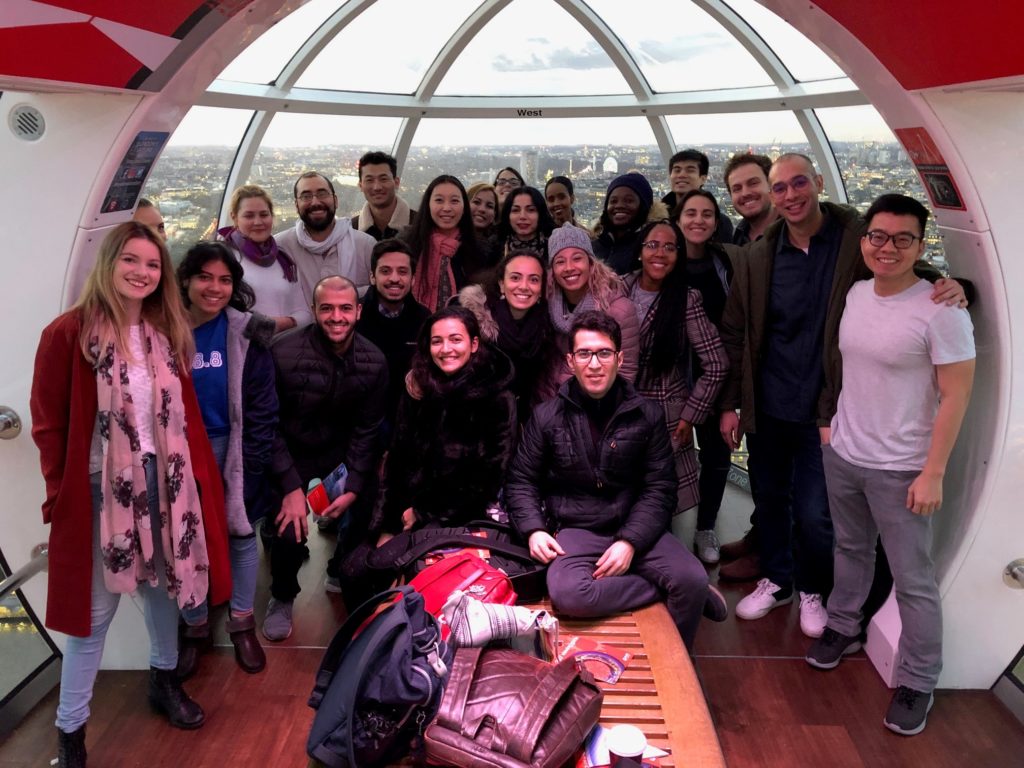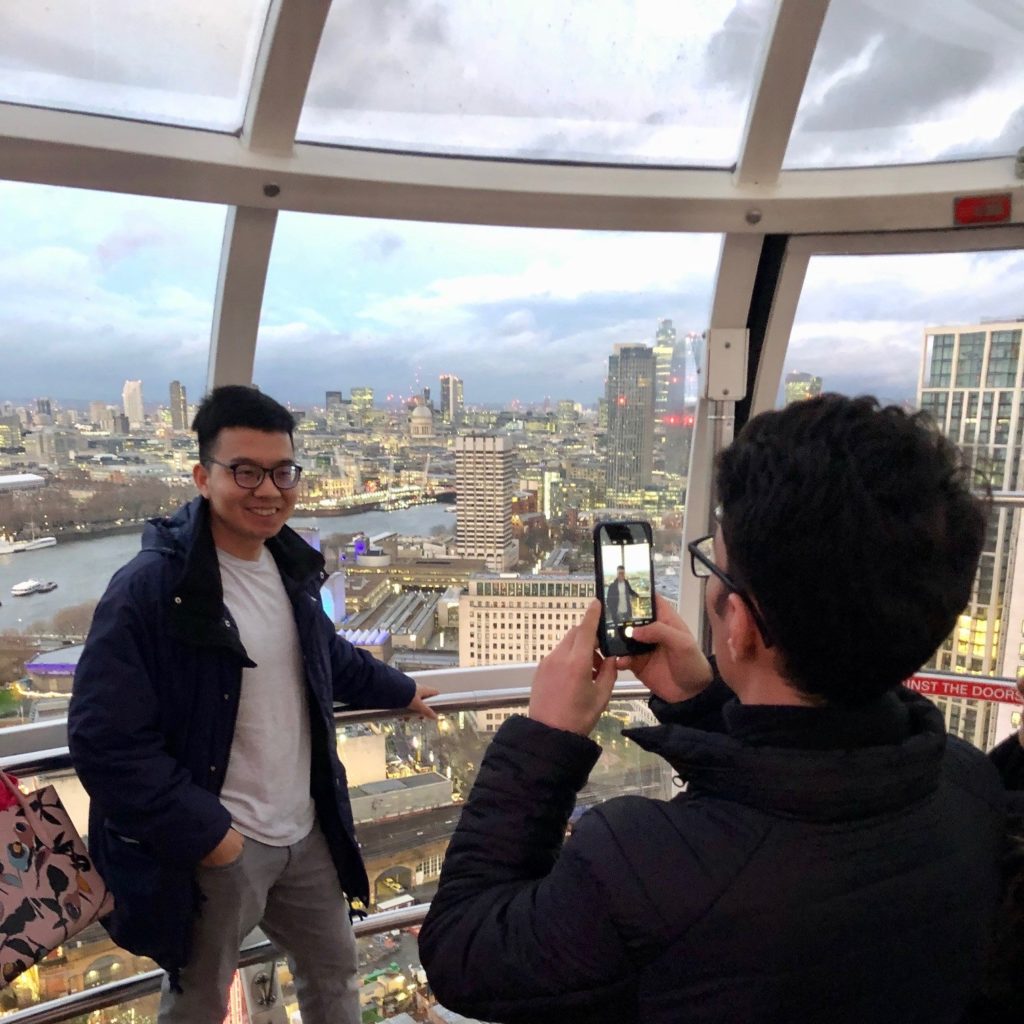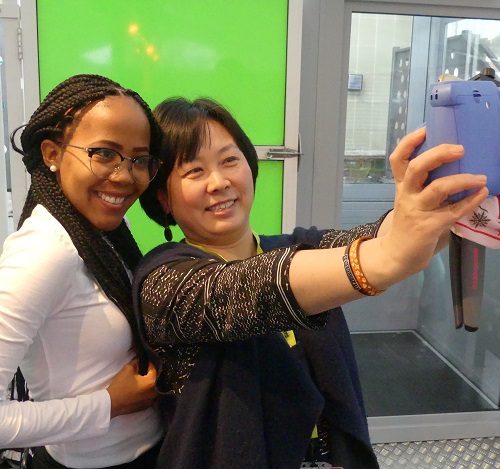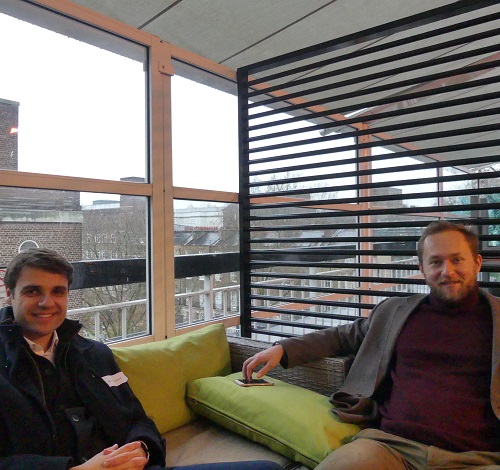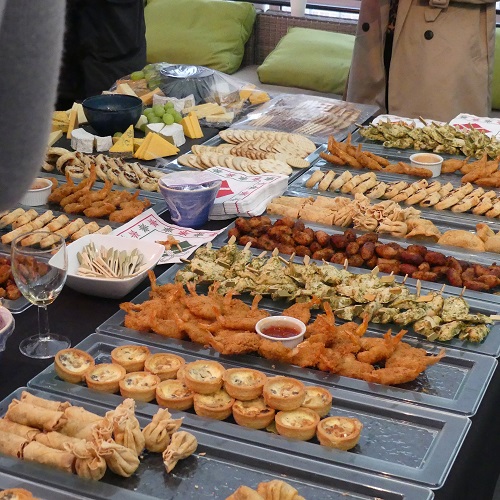Birkbeck/SOAS contribution to Global Entrepreneurship Week reveals value of small-scale enterprise
For seven days each November, Global Entrepreneurship Week (GEW) celebrates the people and activities that turn ideas into enterprises. During the week, around the world, events large and small enable individuals to network, learn from experts, meet possible collaborators, and “explore their potential as self-starters and innovators” who can “launch start-ups that… drive economic growth and expand human welfare”, as the GEW website explains.

Asami Miyamoto (pictured right) of Asami Language Services takes part in a Speech Mentoring session
For GEW 2015, which ran from 16 to 22 November, Birkbeck teamed up with the School of Oriental and African Studies (SOAS) to present a wide range of events. One achievement of this partnership was to draw attention to small-scale enterprise and the possible social value of entrepreneurship – the “human welfare” part of GEW’s description: an important focus, alongside images of high-tech Silicon Valley start-ups attaining vast commercial success, which the word “entrepreneurship” may first bring to mind.
This social role was the focus of a talk by Hugo Sintes Pons, Enterprise Development Programme (EDP) Manager, Oxfam GB, on Monday 16 November in SOAS’s Khalili Lecture Theatre, presented by Birkbeck/SOAS. The subject for the evening was “Solving Inequality: Supporting Entrepreneurs Where It Matters Most”.
Hugo’s Oxfam web entry, says the EDP “promotes and invests in early-stage agricultural enterprises that promote economic opportunities”. Its web page explains the EDP “helps many thousands of people – especially women – to work their way out of poverty”. The programme invests “where others don’t go and where the potential for social impact is highest” by providing “expertise from a board of successful businesspeople” as well as loans and grants to build “sustainable businesses”.
Looking at the EDP, the evening offered a view of top-down assistance (capital and expertise) encouraging bottom-up empowerment. By seeking potential entrepreneurs in communities that lack resources, the programme’s aim was to enable local, small-scale entrepreneurship as a vehicle for the poor and disenfranchised to generate initiatives and some wealth and influence for themselves.
In this approach, micro, small and medium enterprises (MSMEs) specifically could benefit. In developing countries, enterprises are often “micro” and informal. SMEs have been labelled the “missing middle” as their financial needs ($5,000 to $2 million) are too large for microfinance lenders, but too small for banks or other investors. Both MEs and SMEs may therefore require forms of support that other institutions cannot offer but that the EDP can draw attention to or consider.
The EDP also sees women specifically as essential to development, and support for their enterprises can help women achieve more influence in otherwise male-dominated societies, and can create wider economic opportunities.
A question-and-answer discussion followed the talk, and the evening also considered ongoing issues facing the EDP and how it was adapting to circumstances and with experience to improve the tactics, strategy and targeting of support.
Issues raised included dealing with low or slow success rates; high costs and challenges for rural enterprises (distance, electricity supply, volatile markets, uncertain climate); difficulties in obtaining business advice; cooperatives versus private limited enterprises; women-friendly versus women-owned businesses; managing relationships with multiple stakeholders, including philanthropists providing time and money; and moving from a market approach towards an enterprise approach.
The event also introduced the audience to the Global Social Entrepreneurship Network (on Twitter @GlobalSEN). Supported by the Cabinet Office, this platform works with social entrepreneurs around the world, pooling their learning, models and expertise.
Overall, the talk was an excellent starting point for GEW 2015 at Birkbeck and SOAS.
GEW Bazaar
Small-scale and social enterprises led by women were also prominent at the Bazaar in the SOAS junior common room on 18 November, a Birkbeck/SOAS version for GEW of an event that SOAS holds roughly once a month.
At the event, SOAS Student Enterprise Officer Issy Schmidt explained that the Bazaar exemplifies the college’s enterprise provision, offering a platform to entrepreneurial students and alumni, and invited external entrepreneurs and small-scale enterprises.
The partnership also found a venue for an event involving a project that perhaps epitomises entrepreneurship’s welfare role: on Tuesday 17 November, Birkbeck’s Clore Management Centre hosted the launch of the book Yeshialem Learns About Fistula, by SOAS student and founder of the Women’s Health Organization International, Habiba Cooper Diallo.
This children’s book, about a medical condition that can result from childbirth, is of great social rather than commercial value, and publication required considerable entrepreneurial ability from the author. Together, Birkbeck and SOAS played a part in promoting this book, in providing a platform for a project that perhaps represented an aspect of these colleges’ partnership in promoting social enterprise for GEW 2015.
Businesses at the Bazaar included Women Worldwide, founded by director Susan Ma, in October 2014 as a platform to sell products made by women, “supporting these women to earn a living through craft, and not through charity”.
On display were an enticing range of creams, jewellery and other beautifully handcrafted items sourced globally, and Susan saw her company as addressing a need that extends beyond developing countries: “It’s for women all over [the world]… We’ve got women who are refugees here… It’s about trying to create opportunity through trade, and for women to be able to take their own direction in life and make their own choices – and money helps that.”
She also considers a wider economic argument for women’s empowerment: “One projection I have heard is that if we empowered all women in the world today, its economy would increase by $30 trillion.” That’s almost twice US GDP in 2014.
Susan was one of the day’s external participants. An invitation to speak at a careers event led to the Bazaar and involvement in Student Hub internship schemes.
Another enterprise at the Bazaar was the henna stall run by economics students Khadeeja Shahid and Sharmeen Shani. Besides raising money for the Sindh Institute of Urology and Transplantation, the two entrepreneurs were helping to extend henna’s cultural reach in London – and generate male as well as female interest in a form of body art reassuringly less permanent than tattooing.
Social anthropology student Tayler Ulmer has brought her family’s baking from back home in Chicago to SOAS, giving others the chance to try it at the Bazaar. Did she see herself as a global entrepreneur? “Sure,” the Bazaar had given her a taste for business….. and for London “I love it here… It’s very diverse – just a great experience… I think I want to live here – as long as I can make my own food!”
Starting a business
For those inspired to turn ideas into business, perhaps by events during GEW, Enterprise Club at Birkbeck on Wednesday 18 November offered some important insights on first steps.
The evening’s facilitator, Ben Leon, founded executive coaching and consulting company Bravo Lima, and has extensive experience in many areas of business, particularly travel.
Points addressed included planning – strategy on one page – and realistic schedules divided into timeframes of six months, three months and one month, with the customer at the centre of the strategy.
Highlighting examples from his own career as well as case studies of other businesses, Ben indirectly discussed what Michael Porter and Mark Kramer, in a Harvard Business Review article, call “creating ‘shared value’ – generating economic value in a way that also produces value for society by addressing its challenges”. Doing this could help start-ups build a virtuous cycle of recommendations and advocates.
Reflecting Birkbeck’s student diversity, international differences were discussed, ranging from policy, regulation, and tax complexities around starting new businesses in France, to attracting international trade to Brazil, and ecommerce in Georgia.
The discussion identified various resources. For business mentoring, Birkbeck has Enterprise Pathways, Mentoring Pathways, and the Work Readiness Programme. Outside Birkbeck there are the Institute of Directors’ 99 Programme and student membership, Meetup, London Small Business Centre and general interest events on Eventbrite.
For business services there are Upwork or Fiverr to find freelancers to work with, firms like Veale Wasbrough Vizards for start-up-specific legal services, Escape the City to seek like-minded people looking to change career, and Worthwhile for those seeking to start a career with social impact.
Concluding, Ben warned that start-ups could be rewarding but hard work. While those concerned with intellectual property rights and protecting ideas would have to take care with what and how to communicate, the speaker outlined the benefits of sharing the burden by taking advice, sharing ideas and meeting others with complementary strengths.
Speed Mentoring: Key Note Speaker

Dr Harveen Chugh (pictured right) leads a Speed Mentoring session
The Speed Mentoring event on 19th November in the Court Room of Senate House, was the perfect opportunity for entrepreneurial students to get some one-to-one expert advice on a whole range of subjects. The Key note speaker was Dr Harveen Chugh, who recently established her own entrepreneurship consultancy business working with universities, start-ups and the government.
During her speech, Harveen suggested that starting an enterprise was down to the passion and desire of the individual, and firmly believes that there is an entrepreneurial personality with specific traits. These traits include creativity, being innovative, a risk-taker and an idea-generator. Entrepreneurial individuals could be motivated by money, ambition, or not having any fear of failure.
She also pointed out that more enterprise support is available now than ever before, with last year seeing a record-breaking 581,713 start-ups in the UK, which meant it ranked 4th most entrepreneurial country in the world, and the most entrepreneurial in Europe.
Harveen drew attention to Accelerators, which can speed up the process of launching businesses and typically take equity for seed funding to help finance the start-up. She highlighted the importance of selecting an Accelerator which has the most relevant network of contacts. She also emphasised the proximity of London’s own Tech City: with so many experienced entrepreneurs so close, it is incredibly helpful to get involved at the silicon roundabout. As she pointed out, it is the third-largest technology start-up cluster in the world after San Francisco and New York City.
Harveen highlighted the importance of being prepared to be able to discuss a new start-up with anyone at any time, as funding can come from anywhere. Harveen also encouraged students to organise sale meetings in order to experience the process and take feedback on focus areas.
She concluded by drawing attention to an important attitude shift, where it is now ‘cool to fail’ in business. Many employers see the passion and courage necessary for establishing a start-up as positive attributes. There are also now more opportunities available for entrepreneurially-minded individuals within organisations to lead and develop projects.
Her final words encouraged her audience to go out, take the risk, and enjoy it!
Speed Mentoring Sessions
Harveen’s speech was then followed by 1-2-1 speed mentoring for students with 11 specialist entrepreneurial mentors, allowing students the opportunity to discuss their enterprise ideas and gain valuable advice and insight into starting their own business.
The mentors were:
- Dr Harveen Chugh, Entrepreneurship Consultant
- Natalie Campbell, Founder of ‘A Very Good Company’; Director of ‘Kensington Creates’
- Vivi Friedgut, Founder of ‘Blackbullion’
- Asami Miyamoto, Founder of ‘Asami Language Services’
- Ben Leon, Managing Partner of ‘Bravo Lima’
- Frederique Prevost, Founder of ‘Aware Square’
- Nishal Desai, Co-Founder of ‘Imin’
- Ilma Ibrisevic, Business Development Associate at ‘Balloon Ventures’
- Naqiyah Sultan, Founder, ‘Kashka’
- Yasmin Desai, Founder of ‘thestartupgirl.co.uk’
- Anisah Osman Britton, Founder of ‘Allia.io’
“There was a wonderful buzz in the room for the Enterprise Speed Mentoring event. As a mentor, whilst the 1-to-1s with the students were short and intense, I was impressed with their level of preparedness for the sessions and their engagement. The incredible richness of diversity of business ideas the students brought to the table was inspiring, and the feedback received was the most rewarding.”
Ben Leon, Managing Partner, Bravo Lima
Tea & Cake Drop In.
This was an opportunity for students to drop in and gain specific one to one advice related to their business ideas or enterprises provided by Claire Renwick, Student Enterprise Manager, SOAS.
Advice included:
- Branding
- Funding
- Marketing
- Target Market
- Networking
The event was an opportunity for students at all stages of their enterprise journey to have an honest chat regarding their business idea in a relaxed and welcoming atmosphere.
The way ahead
Together, Birkbeck and SOAS presented a variety of exciting events during GEW 2015. The experience offers an enticing prospect for future collaborations. Please visit Enterprise Pathways for upcoming opportunities.
Find out more
